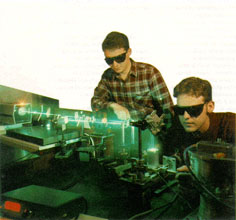


 |
 |
|
 |
||
Physics is the study of nature and the world in which we live and so occupies a central position in science. The subject is concerned with the whole range of natural phenomena, from the study of sub-atomic particles to the structure of the universe. Physics also has a wide range of practical applications of physics, including such diverse ones as the design of new power systems or medical equipment, and the detection and measurements of environmental pollutants or flaws in structures. Nearly all new technologies, from lasers, transistors and microchips to medical scanners and electron microscopes result from advances in fundamental physics. Above all Physics is an exciting, challenging subject and the courses at Swansea provide an ideal training. In a recent teaching quality assessment carried out by the Higher Education Funding Councils for England and Wales, the Swansea Department was rated an ‘Excellent’ - the highest possible grading. We have excellent undergraduate and research laboratories, electronic and mechanical workshops, and an extensive computer network, comprising a large number of PC’s and high-power workstations, all having access to the Internet.
|
| entry | ||
With the exception of course F301, you normally need three A levels, including Physics and Mathematics. Typical grades offered are three C’s. In certain circumstances two A levels of sufficiently high grade may be accepted, or one or two AS levels may be substituted for the third subject. General Studies is not acceptable. For Single Honours MPhys, and Joint Honours Physics and Mathematics, the requirements are B in Physics or Mathematics, and two further C’s. Careful consideration is given to applicants with non-A level qualifications. Typical requirements: BTEC, normally 4 distinctions (including Physics and Mathematics) and 1 merit in Level III units; Scottish Highers, BBBCC, including Physics B; Irish Leaving Certificate, BBCCCC, including Physics B; IB, 26 points overall, with Physics and Mathematics at higher level; GNVQ (Advanced), each application considered on its own merits. All applicants are invited to interview and offers of admission are made on an individual basis. A number of scholarships, worth £350 per annum for three or four years, depending on the course, are awarded by the Department on a competitive basis following interview.
|
||
| schemes | |||||||||||||||||||||||||||||||||||||||||||||||||||||||||||||||||||||||||||
The four year Integrated BSc has a foundation year, which enables you to acquire a basic knowledge before proceeding to Level 1. It also offers applicants with non-scientific A levels the chance to convert from arts to science. The foundation year comprises 80 credit points in physics, including lecture courses in optics and wave motion, electricity, mechanics, thermal and atomic physics, and laboratory techniques, plus a further 40 credit points in mathematics. The usual entry point for students following the Single Honours BSc or MPhys degree schemes is Level 1. Here you take 80 credit points in physics, including lecture courses not only in basic topics such as dynamics and thermal physics, but also introductions to more contemporary areas such as astronomy and cosmology, relativity, and quantum physics. 20 credit points are laboratory-based. A further 40 credit points are taken outside physics, at least 30 of which must be in mathematics. In subsequent levels, all credit points are in physics. For example, in Level 2, as well as 80 credit points of core lectures and 20 points of laboratory physics, there are 10 credit points devoted to the student’s choice of specialist option, and 10 credit points for a group project in which students work in small groups on a large experiment, developing teamwork and communication skills. In Level 3 students have a further 20 credit points in their specialist option and also undertake an extensive experimental or theoretical project accounting for 20 credit points. Physics with a Year Abroad (F302) is a four year scheme. The third year is spent in an overseas university and enables development of language skills together with the experience of a different approach to the subject. The MPhys degree is intended for aspiring professional physicists. The first two years of study are common with the BSc and transfers between the two schemes are possible up to the end of Level 2. The last two years contain modules special to the MPhys, focusing on applications of the fundamental principles you have learned. Emphasis is also placed on an extended research project, counting 60 credit points. The research project can be carried out either within one of the research groups in the department or at an approved external placement. The Joint Honours BSc in Physics and Mathematics, taught jointly with our colleagues in the Mathematics Department, is suitable for more theoretically-inclined students, and reflects the expertise of our Theoretical Particle Physics group, one of the country’s largest. In the first two years 60 credit points are studied in each department. The final year permits a wide choice of options. Further details of all the courses are given in our departmental brochure, available from the Admissions Tutor.
|
|||||||||||||||||||||||||||||||||||||||||||||||||||||||||||||||||||||||||||
| how | ||
Teaching is given through lectures, laboratory work, examples classes and weekly tutorials. In addition a personal tutor will follow your progress throughout your university career and help and advise with non-academic matters. A student/staff consultative committee encourages informal exchange of views on both teaching and social sides of departmental life.
|
||
| careers | ||
|
||
| enquiries | ||||||
|
||||||